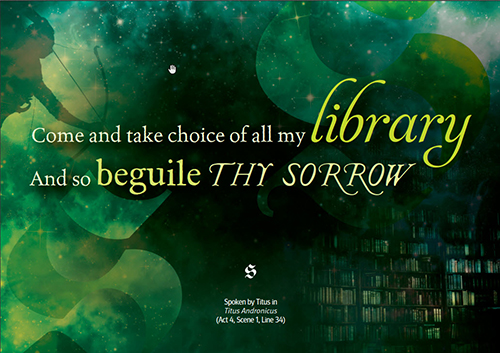To celebrate Shakespeare's birthday, Oxford University Press came up with the following interesting facts about Shakespeare.
If you want to find out more about Shakespeare's works check out The New Oxford Shakespeare Online.
For more information about William Shakespeare check out this article from Oxford Dictionary of National Biography.
Read Helen's post about library Shakespeare celebrations on Tuesday 23 April.

- Did you know we don’t actually know the exact date Shakespeare was born? We do know that he was baptized on 26th April 1564, which means he was probably born on 21st, 22nd, or 23rd April 1564 (given the 1559 prayer book's instructions to parents on the subject of baptisms).
- Shakespeare’s works are constantly being renewed and reborn, just like the phoenix rising from the ashes. For instance, did you know that both Forbidden Planet (1956) and Prospero's Books (1991) are retellings of The Tempest? And that Disney’s The Lion King (1994) was influenced by Hamlet?
-
'Let the bird of loudest lay (one of Shakespeare’s poems) is thought to be about a phoenix:
“Let the bird of loudest lay,
On the sole Arabian tree,
Herald sad and trumpet be:
To whose sound chaste wings obey.” (lines 1-4).
The editor’s note to this poem explains that “The reference to the sole Arabian tree…the traditional resort of the Phoenix (as in Tempest 3.3.23), may imply that the Phoenix is meant” (Colin Burrow, The Oxford Shakespeare: The Complete Sonnets and Poems). However, some believe that the bird referred may not be a phoenix, but a crane. - Birth plays a key role in many of Shakespeare’s works, appearing 84 times in The New Oxford Shakespeare Online. Shakespeare speaks about birth in a variety of ways in his works, ranging from explaining a person’s status through their birth: York in Henry VI Part 2 describes the sons of York “thy betters in their birth” (5.1.119); to describing the start of a new season: Perdita in The Winter’s Tale talks of “the birth / Of trembling winter” (4.4.80-1).
- Did you know that when Shakespeare married Anne Hathaway the record in the register mistakenly referred to the bride as Anne Whateley of Temple Grafton?
- There are many children in Shakespeare’s works ranging from the tragic (the Two Princes in the Tower, Romeo and Juliet, and Hamlet), to the excited new generation (Miranda in The Tempest). As there are many children, there are also many parents! These include controlling fathers and absent mothers: for example Brabantio in Othello, the Duke in The Merchant of Venice, and King Lear in King Lear. In the opening of this play, Lear disowns his favourite (and youngest) daughter when she cannot answer his question on how much she loves him:
“Thy truth then be thy dower;
For by the sacred radiance of the sun,
The mysteries of Hecate and the night,
By all the operation of the orbs
From whom we do exist and cease to be,
Here I disclaim all my paternal care” (1.1.100-5) - Shakespeare’s twin children, Hamnet and Judith, were possibly named after a local baker and his wife, Hamnet and Judith Sadler. The husband, Hamnet, was one of the witnesses to Shakespeare's will.
- Shakespeare unfortunately lost his only son in 1596, aged just eleven and a half. This grief came through in many of his later works, especially evident in Twelfth Night when Viola mourns for the apparent death of her twin brother.
- Shakespeare uses the word “fool” 174 times in his works (according to New Oxford Shakespeare) – that’s 3 and a half fools for every April Fools’ Day during his life!
- “One of the unfounded myths about Shakespeare is that all we know about his life could be written on the back of a postage stamp” (taken from the ‘General Introduction’ of The Oxford Shakespeare: The Complete Works (Second Edition)). The most recent discoveries include showing Shakespeare to be a food hoarder and threatened with jail for tax evasion!



Add a comment to: 10 Facts for Shakespeare’s Birthday